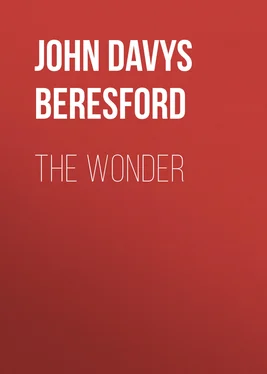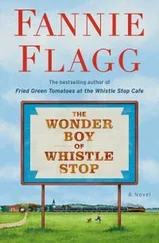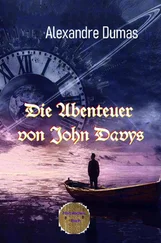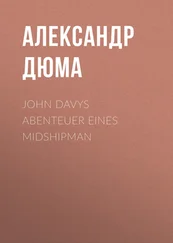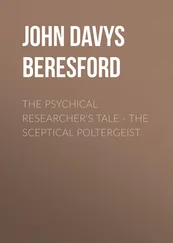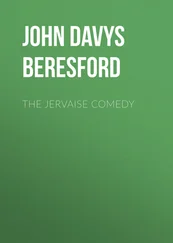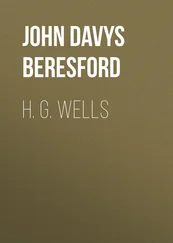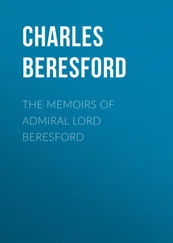John Davys Beresford - The Wonder
Здесь есть возможность читать онлайн «John Davys Beresford - The Wonder» — ознакомительный отрывок электронной книги совершенно бесплатно, а после прочтения отрывка купить полную версию. В некоторых случаях можно слушать аудио, скачать через торрент в формате fb2 и присутствует краткое содержание. Жанр: foreign_prose, foreign_antique, на английском языке. Описание произведения, (предисловие) а так же отзывы посетителей доступны на портале библиотеки ЛибКат.
- Название:The Wonder
- Автор:
- Жанр:
- Год:неизвестен
- ISBN:нет данных
- Рейтинг книги:3 / 5. Голосов: 1
-
Избранное:Добавить в избранное
- Отзывы:
-
Ваша оценка:
- 60
- 1
- 2
- 3
- 4
- 5
The Wonder: краткое содержание, описание и аннотация
Предлагаем к чтению аннотацию, описание, краткое содержание или предисловие (зависит от того, что написал сам автор книги «The Wonder»). Если вы не нашли необходимую информацию о книге — напишите в комментариях, мы постараемся отыскать её.
The Wonder — читать онлайн ознакомительный отрывок
Ниже представлен текст книги, разбитый по страницам. Система сохранения места последней прочитанной страницы, позволяет с удобством читать онлайн бесплатно книгу «The Wonder», без необходимости каждый раз заново искать на чём Вы остановились. Поставьте закладку, и сможете в любой момент перейти на страницу, на которой закончили чтение.
Интервал:
Закладка:
I noticed that Stott had tied a handkerchief round his finger, but I forgot the incident until I saw Findlater beckon to his best bowler, a few overs later. Notts had made enough runs for decency; it was time to get them out.
I saw Stott walk up to Findlater and shake his head, and through my glasses I saw him whip the handkerchief from his finger and display his hand. Findlater frowned, said something and looked towards the pavilion, but Stott shook his head. He evidently disagreed with Findlater's proposal. Then Mallinson came up, and the great bulk of his back hid the faces of the other two. The crowd was beginning to grow excited at the interruption. Every one had guessed that something was wrong. All round the ring men were standing up, trying to make out what was going on.
I drew my inferences from Mallinson's face, for when he turned round and strolled back to his wicket, he was wearing a broad smile. Through my field glasses I could see that he was licking his lower lip with his tongue. His shoulders were humped and his whole expression one of barely controlled glee. (I always see that picture framed in a circle; a bioscopic presentation.) He could hardly refrain from dancing. Then little Beale, who was Mallinson's partner, came up and spoke to him, and I saw Mallinson hug himself with delight as he explained the situation.
When Stott unwillingly came back to the pavilion, a low murmur ran round the ring, like the buzz of a great crowd of disturbed blue flies. In that murmur I could distinctly trace the signs of mixed feelings. No doubt the crowd had come there to witness the performances of the new phenomenon—the abnormal of every kind has a wonderful attraction for us—but, on the other hand, the majority wanted to see their own county win. Moreover, Mallinson was giving them a taste of his abnormal powers of hitting, and the batsman appeals to the spectacular, more than the bowler.
I ran down hurriedly to meet Stott.
"Only a split finger, sir," he said carelessly, in answer to my question; "but Mr. Findlater says I must see to it."
I examined the finger, and it certainly did not seem to call for surgical aid. Evidently it had been caught by the seam of the new ball; there was a fairly clean cut about half an inch long on the fleshy underside of the second joint of the middle finger.
"Better have it seen to," I said. "We can't afford to lose you, you know, Stott."
Stott gave a laugh that was more nearly a snarl. "Ain't the first time I've 'ad a cut finger," he said scornfully.
He had the finger bound up when I saw him again, but it had been done by an amateur. I learnt afterwards that no antiseptic had been used. That was at lunch time, and Notts had made a hundred and sixty-eight for one wicket; Mallinson was not out, a hundred and three. I saw that the Notts Eleven were in magnificent spirits.
But after lunch Stott came out and took the first over. I don't know what had passed between him and Findlater, but the captain had evidently been over-persuaded.
We must not blame Findlater. The cut certainly appeared trifling, it was not bad enough to prevent Stott from bowling, and Hampdenshire seemed powerless on that wicket without him. It is very easy to distribute blame after the event, but most people would have done what Findlater did in those circumstances.
The cut did not appear to inconvenience Stott in the least degree. He bowled Mallinson with his second ball, and the innings was finished up in another fifty-seven minutes for the addition of thirty-eight runs.
Hampdenshire made two hundred and thirty-seven for three wickets before the drawing of stumps, and that was the end of the match, for the weather changed during the night and rain prevented any further play.
I, of course, stayed on in Nottingham to await results. I saw Stott on the next day, Friday, and asked him about his finger. He made light of it, but that evening Findlater told me over the bridge-table that he was not happy about it. He had seen the finger, and thought it showed a tendency to inflammation. "I shall take him to Gregory in the morning if it's not all right," he said. Gregory was a well-known surgeon in Nottingham.
Again one sees, now, that the visit to Gregory should not have been postponed, but at the time one does not take extraordinary precautions in such a case as this. A split finger is such an everyday thing, and one is guided by the average of experience. After all, if one were constantly to make preparation for the abnormal; ordinary life could not go on....
I heard that Gregory pursed his lips over that finger when he had learned the name of his famous patient. "You'll have to be very careful of this, young man," was Findlater's report of Gregory's advice. It was not sufficient. I often wonder now whether Gregory might not have saved the finger. If he had performed some small operation at once, cut away the poison, it seems to me that the tragedy might have been averted. I am, I admit, a mere layman in these matters, but it seems to me that something might have been done.
I left Nottingham on Saturday after lunch—the weather was hopeless—and I did not make use of the information I had for the purposes of my paper. I was never a good journalist. But I went down to Ailesworth on Monday morning, and found that Findlater and Stott had already gone to Harley Street to see Graves, the King's surgeon.
I followed them, and arrived at Graves's house while Stott was in the consulting-room. I hocussed the butler and waited with the patients. Among the papers, I came upon the famous caricature of Stott in the current number of Punch —the "Stand-and-Deliver" caricature, in which Stott is represented with an arm about ten feet long, and the batsman is looking wildly over his shoulder to square leg, bewildered, with no conception from what direction the ball is coming. Underneath is written "Stott's New Theory—the Ricochet. Real Ginger." While I was laughing over the cartoon, the butler came in and nodded to me. I followed him out of the room and met Findlater and Stott in the hall.
Findlater was in a state of profanity. I could not get a sensible word out of him. He was in a white heat of pure rage. The butler, who seemed as anxious as I to learn the verdict, was positively frightened.
"Well, for God's sake tell me what Graves said," I protested.
Findlater's answer is unprintable, and told me nothing.
Stott, however, quite calm and self-possessed, volunteered the information. "Finger's got to come off, sir," he said quietly. "Doctor says if it ain't off to-day or to-morrer, he won't answer for my 'and."
This was the news I had to give to England. It was a great coup from the journalistic point of view, but I made up my three columns with a heavy heart, and the congratulations of my editor only sickened me. I had some luck, but I should never have become a good journalist.
The operation was performed successfully that evening, and Stott's career was closed.
VII
I did not see Stott again till August, and then I had a long talk with him on the Ailesworth County Ground, as together we watched the progress of Hampdenshire's defeat by Lancashire.
"Oh! I can't learn him nothing ," he broke out, as Flower was hit to the four corners of the ground, "'alf vollies and long 'ops and then a full pitch—'e's a disgrace."
"They've knocked him off his length," I protested. "On a wicket like this …"
Stott shook his head. "I've been trying to learn 'im," he said, "but he can't never learn. 'E's got 'abits what you can't break 'im of."
"I suppose it is difficult," I said vaguely.
"Same with me," went on Stott, "I've been trying to learn myself to bowl without my finger"—he held up his mutilated hand—"or left-'anded; but I can't. If I'd started that way … No! I'm always feeling for that finger as is gone. A second-class bowler I might be in time, not better nor that."
Читать дальшеИнтервал:
Закладка:
Похожие книги на «The Wonder»
Представляем Вашему вниманию похожие книги на «The Wonder» списком для выбора. Мы отобрали схожую по названию и смыслу литературу в надежде предоставить читателям больше вариантов отыскать новые, интересные, ещё непрочитанные произведения.
Обсуждение, отзывы о книге «The Wonder» и просто собственные мнения читателей. Оставьте ваши комментарии, напишите, что Вы думаете о произведении, его смысле или главных героях. Укажите что конкретно понравилось, а что нет, и почему Вы так считаете.
